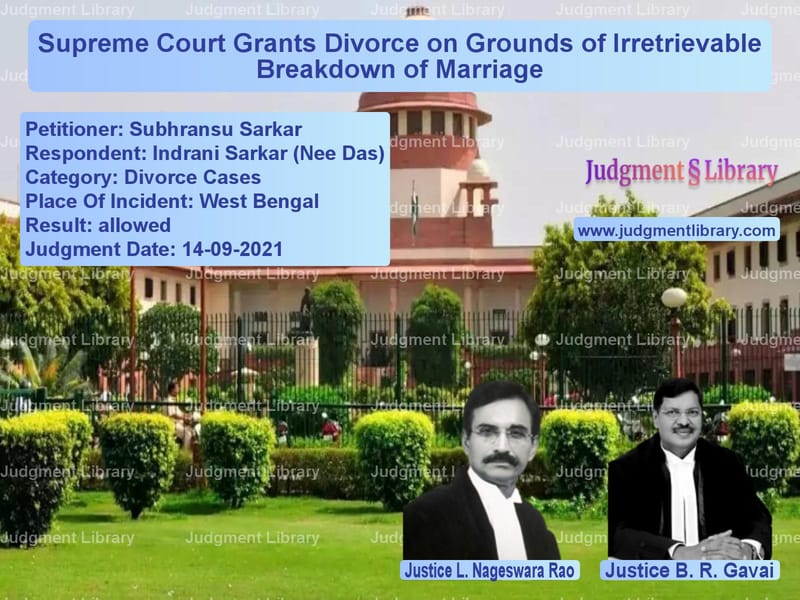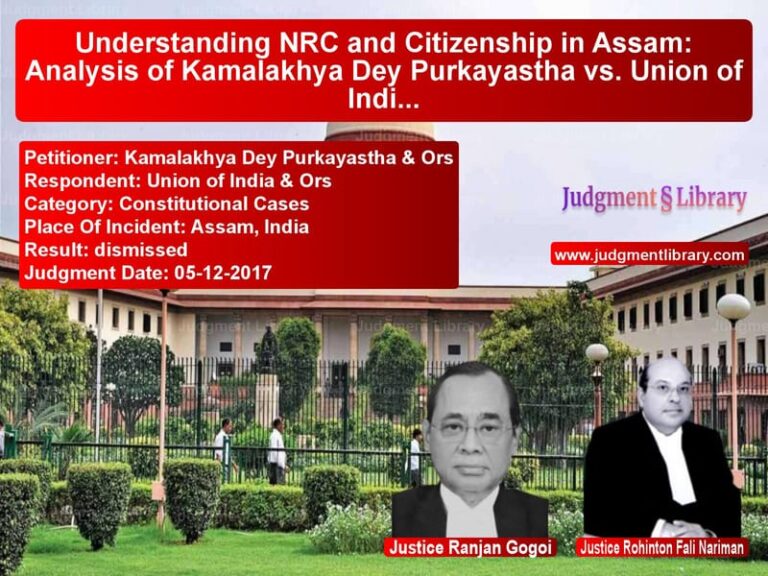Supreme Court Grants Divorce on Grounds of Irretrievable Breakdown of Marriage
The Supreme Court of India, in the case of Subhransu Sarkar vs. Indrani Sarkar (Nee Das), ruled on a long-standing marital dispute, granting divorce on the grounds of irretrievable breakdown of marriage under its powers under Article 142 of the Constitution of India. This judgment underscores the Court’s discretion to dissolve unworkable marriages even when one party refuses to consent.
Background of the Case
The appellant, Subhransu Sarkar, married the respondent, Indrani Sarkar (Nee Das), on March 2, 1997, under the Special Marriage Act, 1954. The marriage was later solemnized according to Hindu rites on December 7, 2000. Alleging cruelty and desertion by the respondent, the appellant filed for divorce on March 5, 2007, before the District Judge, Alipore.
The appellant’s key allegations included:
- The respondent frequently left the matrimonial home without justification.
- She insisted that the appellant live separately from his parents.
- She misbehaved with her in-laws.
- She physically assaulted the appellant during trips to Puri and Shillong.
The respondent denied these allegations and accused the appellant of adultery and excessive alcohol consumption.
Legal Proceedings
1. Trial Court’s Decision
The Trial Court dismissed the appellant’s plea for divorce, stating that he failed to establish cruelty by the respondent.
2. High Court’s Decision
The appellant appealed to the Calcutta High Court, but the High Court upheld the Trial Court’s decision, refusing to grant divorce.
3. Appeal to the Supreme Court
Dissatisfied with the High Court’s ruling, the appellant approached the Supreme Court, citing irretrievable breakdown of marriage and reliance on precedents that allowed divorce under Article 142.
Supreme Court’s Key Observations
1. Marital Discord Beyond Reconciliation
The Supreme Court noted that the parties had been living separately for over 16 years and observed:
“For all practical purposes, the marriage is dead. There is no chance of reconciliation.”
2. Exercise of Powers Under Article 142
The Court cited previous cases where it had dissolved unworkable marriages under Article 142:
- Sukhendu Das vs. Rita Mukherjee (2017) 9 SCC 632: The Court granted divorce after 17 years of separation, stating that there was no possibility of reconciliation.
- Munish Kakkar vs. Nidhi Kakkar (2020) 14 SCC 657: The Court dissolved the marriage to end prolonged litigation.
The Court emphasized that it had the power to dissolve a marriage when all efforts to continue it had failed.
3. Respondent’s Refusal to Accept Breakdown
The respondent, despite separation of 16 years, insisted on continuing the marriage. However, the Court noted that no meaningful effort had been made for reconciliation and that the respondent’s insistence was not practical.
Read also: https://judgmentlibrary.com/supreme-court-allows-delay-in-divorce-appeal-under-special-marriage-act/
4. Financial Settlement for the Respondent
The Court took note of the respondent’s circumstances, particularly her responsibility to care for a son suffering from serious ailments. To ensure financial security, the Court directed the appellant to pay:
- A lump sum of Rs. 25 lakhs within eight weeks.
- The respondent to withdraw her Section 125 Cr.PC maintenance case upon receipt of the payment.
Final Judgment
The Supreme Court ruled:
- The marriage between the appellant and respondent was dissolved under Article 142.
- The appellant was directed to pay Rs. 25 lakhs to the respondent within eight weeks.
- The payment was in full and final settlement of all claims.
Implications of the Judgment
This ruling has significant implications for divorce cases in India:
1. Recognition of Irretrievable Breakdown
The judgment reinforces that prolonged separation can be grounds for divorce even if one party refuses consent.
2. Role of Article 142 in Matrimonial Cases
The ruling strengthens the Supreme Court’s discretion to dissolve marriages when reconciliation is impossible.
3. Ensuring Financial Security
The Court’s decision to award financial compensation ensures that the respondent is not left financially vulnerable after divorce.
4. Precedent for Future Cases
The judgment sets a precedent for similar cases where marital disputes linger for decades without resolution.
Conclusion
The Supreme Court’s decision in Subhransu Sarkar vs. Indrani Sarkar is a landmark ruling affirming the principle of irretrievable breakdown of marriage as a valid ground for divorce. By exercising its powers under Article 142, the Court ensured that prolonged marital disputes do not continue indefinitely. This ruling provides much-needed relief to individuals trapped in legally dead marriages while balancing financial security for affected spouses.
Read also: https://judgmentlibrary.com/supreme-court-resolves-matrimonial-dispute-through-settlement-agreement/
Petitioner Name: Subhransu Sarkar.Respondent Name: Indrani Sarkar (Nee Das).Judgment By: Justice L. Nageswara Rao, Justice B. R. Gavai.Place Of Incident: West Bengal.Judgment Date: 14-09-2021.
Don’t miss out on the full details! Download the complete judgment in PDF format below and gain valuable insights instantly!
Download Judgment: subhransu-sarkar-vs-indrani-sarkar-(nee-supreme-court-of-india-judgment-dated-14-09-2021.pdf
Directly Download Judgment: Directly download this Judgment
See all petitions in Alimony and Maintenance
See all petitions in Mutual Consent Divorce
See all petitions in Property Division in Divorce Cases
See all petitions in Divorce by Desertion
See all petitions in Judgment by L. Nageswara Rao
See all petitions in Judgment by B R Gavai
See all petitions in allowed
See all petitions in supreme court of India judgments September 2021
See all petitions in 2021 judgments
See all posts in Divorce Cases Category
See all allowed petitions in Divorce Cases Category
See all Dismissed petitions in Divorce Cases Category
See all partially allowed petitions in Divorce Cases Category







